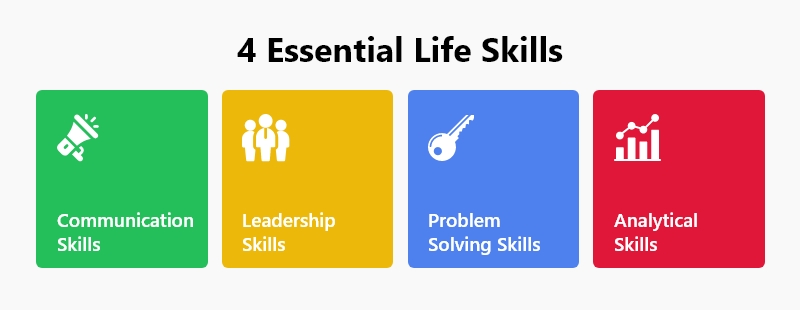It’s the year 2024. You are pursuing graduation in the college of your dreams. Your academic excellence did it’s part. Made you a part of the crowd.
Great Job!
From now on, a whole new beginning.
I say ‘new’ because up until now the majority of your focus had bluntly been on academics. But from this moment on, it has to be precisely divided between 2 major aspects. Grades and Character.
The concept of Grades, we can all debate upon!
Well, what about Character? The term is often mistaken to be ambivalent. So much so that some interpretations confuse Personality for character or vice versa.
“But don’t they both play identical roles? Portraying the traits of a person?”
Yes, they do! But there’s a fine line.
Although Personality and Character are related, they are not the same thing.
While Personality is the cumulation of natural traits, character is the set of traits learnt by a person over time.
Now, we know by definition what Character as an aspect stands for.
Next up is how to create a solid one.
Enter The real world skills for students!
Why Real world skills for students?
Well, the outreach of character is almost infinite. It literally means everything you and I can learn. Good and bad included.
Remember, the idea is to understand the real world skills for students like yourself. The skills which will be the brick and mortar for the structure ‘character’.
Now, when we talk about the real world skills for students a list of prospects pops up. All seeming variably crucial at different points of time.
So, what we’ll be focusing upon is the most fundamental real life skills a student should focus on acquiring over time.
They are:
1. Communication Skills
2. Leadership Skills
3. Problem Solving Skills
4. Analytical Skills

Let us go through each of them, one by one.
1. Communication Skills
The most important things in life are always simple. If there’s an aspect that tops this list it would definitely be ‘Communication’, as with the real life skills for students.
Communication basically refers to the exchange of information. As simple as that.
We all start communicating right when we are babies, so our familiarity with the trait is as old as time. Yet, it is the most sought after character trait in both professional and personal life.
“Why so?”
We all have our own familiar ways of communication. And being able to understand billions of ways of expression is as rough as it sounds. Thus, there’s a standard communication pattern for you, me, and everyone else to refer to.
Just like your Standard Units Of Measurements in Physics.
Adapting to the system is the basic here, being able to control it is the ambition. Your form of expression can be unique, but what’s crucial is for other people to be able to understand the information.
There are 3 fundamental modes of communication.
A. Verbal communication
The most common way of communication which is speaking or writing.
B. Non-Verbal Communication
Non-verbal communication includes gestures, facial expressions, eye contact, body language.
C. Visual communication
The Usage of visual tools such as maps, signs, colors, diagrams to communicate falls under visual communication.
The importance of communication is as straight-forward as it can get. To be able to progress in goals and ambitions, you need to receive information, work on it, and respond accordingly.
How to improve your communication skills?
The mastery of the art of communication is indefinite. No matter how good you are today, you can always be better tomorrow. Thus, better than yesterday and best than ever is the goal.
The basic 3 things that you must always keep in mind to improve communication on a continuous basis is:
- Master The Art Of Listening. When you speak you refer to what you already know, it’s limited. But when you listen there’s no limit to what you can learn. To be able to listen is an irreplaceable sub-aspect of communication.
- Take Your Time To Respond. Interpret the information properly before responding.
- Maintain A Positive Body language. Your body language plays a crucial role in setting the right impression with the audience. Being confident and welcoming go a long way.
How To Master The Art Of Public Speaking?
2. Leadership Skills
After the art of communication, the next aspect in the necessary real life skills for students is Leadership Skills.
I’m pretty sure you have heard it more than just a couple of times up until now. So, what exactly leadership skills mean?
Leadership skills first and foremost comprises strong communication skills. Post that the rest qualities which follow are to :
A. Be able to introduce a sense of collective ownership amongst your team members
The ability to make the members of your team feel equally responsible for the outcome of the project.
B. Have a Sense of empathy towards your team members
Not everyday is going to be the same for the members of your team, neither for you. To be able to comprehend the facts and delegate roles and functions is important.
Your out of form friend needs the backing from you to commit better in the field if he has failed to put runs on the batting scorecard, right?
C. Positivity
Sometimes it may so occur that even after burning the midnight oil for countless nights, the result might not be what you and your team expects. These moments are a real test of character, and to be positive and inspiring then is what truly defines a leader.
Practices for you to acquire Leadership Skills!
I. Get Involved In More Activities. Be a part of the school sports team, project team etc. to know what it’s like to work with others.
II. Practicing Discipline. A leader is respected for the sense of order he brings into the team. Needless to stay, straightening up yourself is the first step to begin with.
Begin with The Art Of Time Management
III. Keep Learning. No wise man ever stopped learning. Keep learning what you think might be beneficial for you, from everyone around you.
3. Problem solving Skills
As we grow up, we realize sometimes because of our choices and sometimes not, we often find ourselves in situations where we ideally wouldn’t want ourselves to be.
The gravity of the situation is seldom the same.
But what’s constant is our attitude towards them. Make way for our third skill in real life skills for students, the problem solving skills.
Problems could range from scoring low grades in exams to the inability to make it to the School Sports team.
Thus there’s no right way to approach problems.
Generally problems are solved in 2 ways, Intuitive and Systematic.
-
Intuitive problem solving
Intuitive problem solving means that you don’t need new information to solve the problem. You have the previous experience or the knowledge required to tackle the particular problem.
-
Systematic problem solving
Systematic problem solving refers to following a logical approach while tackling a situation.
Now, since the situations in life won’t always come according to the scale of our knowledge, we’ll focus on systematic problem solving skills.
How can you imbibe Systemic Problem Solving Skills?
- Broaden The Scale Of Your Creativity. Keep reading books, websites, watching visuals, to broaden the horizon of your creativity. This will provide you with the ability to look at problems differently.
- Sharpen Your Researching Skills. To be able to access related information while in a situation to some out trumps is a skill.
- Practice Teamwork. With proper communication skills, most problems can be solved by taking inputs from other team members. Be open to that.
4.Analytical Skills
The fourth real world skill for students is Analytical Skill. Analytical skill is the ability to gather information, analyze the information in detail, problem solve, and then make decisions accordingly.
It is basically what you make out of a given piece of information, which can literally range from ‘nothing much’ to ‘amazing such’.
So, how do you develop good analytical skills?
I. Practice to be Observant. The ability to learn from the minute details around you. The practice of this habit will always keep you engaged in processing information.
II. Play Brain Games. The more you exercise your brain, the sharper it’ll be to see through situations.
III. Go into the depth of Problems. It’s natural to be okay with focusing just on the solutions. But excellence begins when you go into the roots of problems. This habit makes you fundamentally efficient at problem solving.
Going about cherry picking, the universal constants when it comes to real life skills for students, the above four traits make into the list of every student. And quite rightly so!
Now if you Willing to take the first step towards acquiring each of these fundamental real life skills, we have got something more for you!
JuniorMBA by Clever Harvey is an IIM and Ivy League alumni curated curriculum that develops holistic business and leadership skills that teenagers need to excel in the 21st century.
Certified by Ivy League faculty, the program helps in sharpening your presentation skills, hones innovation & creativity and builds commercial acumen, hence, preparing you to be a leader in the real world.
Learn More About The Junior MBA Program Now!
Got a query? Write to us at guideme@univariety.com and our expert counsellor will get back to you
A wanderer in every sense of the word, Asit’s love for biking is mostly on full throttle. As a writer, he feeds on satire and sarcasm in every possible way he can manage. Asit’s vision is to explore every aspect of Content Creation, from his laptop, on a warm beach, sipping on sweet Coconut water. Well, ideally!


